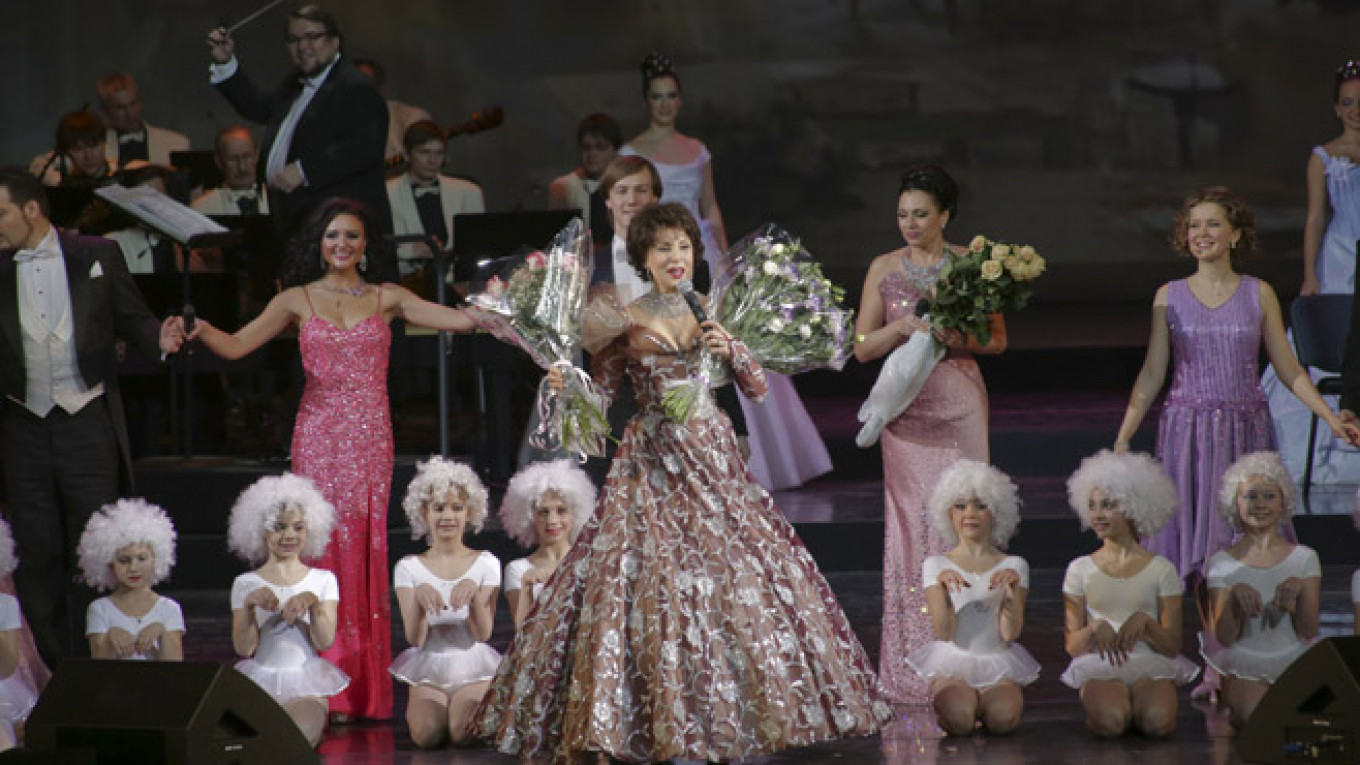"Black eyes, passionate eyes,
Burning and beautiful eyes!
How I love you, how I fear you,
It seems I met you in an unlucky hour!"
Black Eyes
Lovers of Russia know the country's composers, writers and painters — but not the stars and the genre of Russian romance, "one of the most loved and most sweet things to come out of Russian culture," said Galina Preobrazhenskaya, the dark-haired singer and founder of "Romansiada," a Eurovision-style contest for romance singers, which takes place Saturday in the Kremlin.
Rooted in folk song, Russian romance mixes in a gypsy music influence and lyrics of "sentimental courtship, illicit love, pained rejection, and often suicide," according to one study.
"Black Eyes," covered by pre-revolutionary opera singer Fyodor Chaliapin, is probably the most famous romance song and the lyrics, above, tell of one more love affair gone wrong.
Romance songs appeared way before Chaliapin, though.
"My opinion is that when European opera and musical troupes of the 18th and 19th centuries performed their salon music, Russian composers saw a need and felt the desire to compose their own sort of salon music — the art song," said James Dalton Caran, an American opera singer studying in St. Petersburg who will perform Saturday.
By the late 19th century, Russian romance was huge and gypsymania caught hold, write academics James von Geldern and Louise McReynolds in "Entertaining Tsarist Russia."
Restaurants such as the Yar, which still puts on shows today, held gypsy music nights for those "inflamed by hot fantasies of hot-blooded romances with dark-eyed beauties."
"Romance has a long history, longer than 200 years. It is the only genre of music to preserve the Russian language in its pure form," Preobrazhenskaya said in a phone interview.
"This does not make it a historical artifact," she added, "we see new themes, new sounds that the younger generation can bring to the genre." Dalton, a young musician, noted that today it is an important part of the Russian musical tradition and often heard in Russian pop music.
Preobrazhenskaya set up Romansiada 18 years ago to encourage young talented musicians from all over the world to take an interest in and celebrate Russian romance. Regional competitions take place in nineteen countries, including the United States, Bulgaria, Kazakhstan, Sweden and Denmark. Musicians from 63 Russian cities entered and fifty Romansiada stars will take to the stage Saturday.
"They are my pride and joy and I am happy to be able to gather them together on the best stage in the country," said Preobrazhenskaya.
Of those performing at the Kremlin Palace, Preobrazhenskaya, in particular, recommended opera soprano Marina Poplavskaya, Sergei Volchkov — winner of the Russian equivalent of The Voice talent show — and tenor Vladimir Dmitruk, who won the competition two years ago and flies in from Los Angeles where he sings at the LA Opera.
"Romance," Preobrazhenskaya said, "while it is Russian, it is understood by everyone. Everyone can empathize with and value beauty."
Stars of the Romansiada is on Saturday at 6 p.m. Moscow Kremlin, the Troitsky Gate entrance. Ticket office: 1 Ulitsa Vozdvizhenka. Metro Alexandrovsky Sad. 495-628-5232. kremlinpalace.org
Contact the author at artsreporter@imedia.ru
A Message from The Moscow Times:
Dear readers,
We are facing unprecedented challenges. Russia's Prosecutor General's Office has designated The Moscow Times as an "undesirable" organization, criminalizing our work and putting our staff at risk of prosecution. This follows our earlier unjust labeling as a "foreign agent."
These actions are direct attempts to silence independent journalism in Russia. The authorities claim our work "discredits the decisions of the Russian leadership." We see things differently: we strive to provide accurate, unbiased reporting on Russia.
We, the journalists of The Moscow Times, refuse to be silenced. But to continue our work, we need your help.
Your support, no matter how small, makes a world of difference. If you can, please support us monthly starting from just $2. It's quick to set up, and every contribution makes a significant impact.
By supporting The Moscow Times, you're defending open, independent journalism in the face of repression. Thank you for standing with us.
Remind me later.






